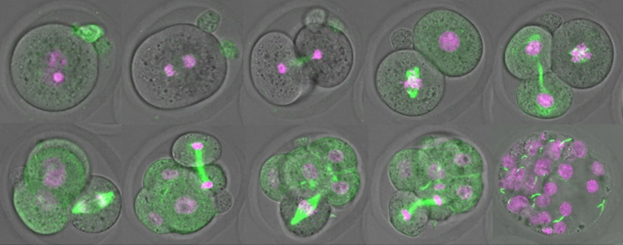Infertility
What is infertility?
Infertility is the inability to achieve a pregnancy after 12 months of unprotected sexual intercourse. In Australia, infertility affects about 1 in 7 couples of reproductive age. Worldwide, infertility affects millions of families.
What causes infertility?
The basis for infertility has conventionally been considered in terms of available diagnostic tests that can determine whether an egg is being released every month (ovulation), whether Fallopian tubes are patent or whether sperm is normal. Notably, however, other critically important determinants of fertility potential operate on a cellular level such as egg quality and embryo development.
What infertility research is being done at UQCCR?
The Christopher Chen Oocyte Biology Lab at UQCCR uses high-resolution imaging of living eggs and embryos combined with molecular approaches to study 3 critical areas that are pivotal for successful pregnancy at the cellular level.

DNA is labelled in magenta and mitotic spindle in green.
- Egg quality: What makes a good egg and can we improve egg quality?
Egg (or oocyte) quality is rate-limiting for pregnancy success as eggs provide virtually all the cellular building blocks required by the early embryo. At present, there are tests that can estimate egg numbers and determine whether ovulation is occurring, but none capable of measuring egg quality.
- Fertilisation: How to start a new life?
Fertilisation refers to the union of sperm and egg to form the earliest embryonic stage known as the zygote. Using live-imaging, our lab is discovering never-before-seen aspects of this unique process of egg-sperm fusion and uncovering fascinating regulatory requirements.
- Preimplantation embryo development: How to set the stage for pregnancy success?
Surprisingly, over 50% of human embryos do not make it past the first week of development after fertilisation. What cellular events underlie this striking inefficiency during early human embryogenesis is a major mystery our lab tries to solve.
